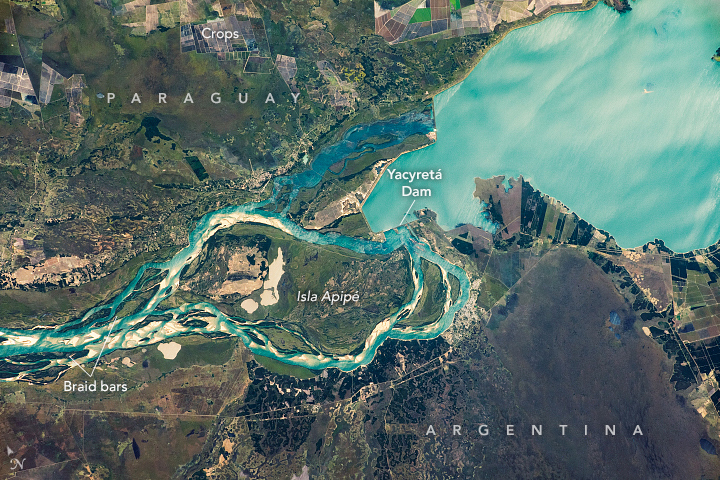The Braided Paraná
Dec 19, 2021
An astronaut onboard the International Space Station (ISS) snapped this photograph of a portion of the Paraná River, the second longest river in South America. It flows mostly northeast to southwest for approximately 4,880 kilometers (3,030 miles), passing through Brazil, Paraguay, and Argentina and making part of the Argentina–Paraguay border.
This image captures some of the interlocking, braided patterns that are common along the Paraná River system. Sediment that eroded upstream from riverbanks in Brazil was carried downriver and deposited and piled up into islands—such as Isla Apipé (Argentina). The sediments also make braid bars, which are smaller, rhomboid-shaped landforms created by the interweaving of water and land as the river level rises and falls over time.
This labyrinth of braided channels also provides routes for small boats and ships, allowing for the transport of goods to inland South America—at least as far upstream as the Yacyretá Dam. Built to generate hydroelectric power, the dam now separates the upper Paraná River from the braid bars.
Farmers cultivate crops such as coffee, corn, and cotton in fields adjacent to the Paraná River floodplain. These crops, among others, have been affected by ongoing drought conditions that began in the region in 2020 and have slowed the transport of goods decrease in water levels.
Astronaut photograph ISS065-E-163199 was acquired on July 9, 2021, with a Nikon D5 digital camera using a focal length of 200 millimeters. It is provided by the ISS Crew Earth Observations Facility and the Earth Science and Remote Sensing Unit, Johnson Space Center. The image was taken by a member of the Expedition 65 crew. The image has been cropped and enhanced to improve contrast, and lens artifacts have been removed. The International Space Station Program supports the laboratory as part of the ISS National Lab to help astronauts take pictures of Earth that will be of the greatest value to scientists and the public, and to make those images freely available on the Internet. Additional images taken by astronauts and cosmonauts can be viewed at the NASA/JSC Gateway to Astronaut Photography of Earth. Caption by Amber Turner, Jacobs, JETS Contract at NASA-JSC.
